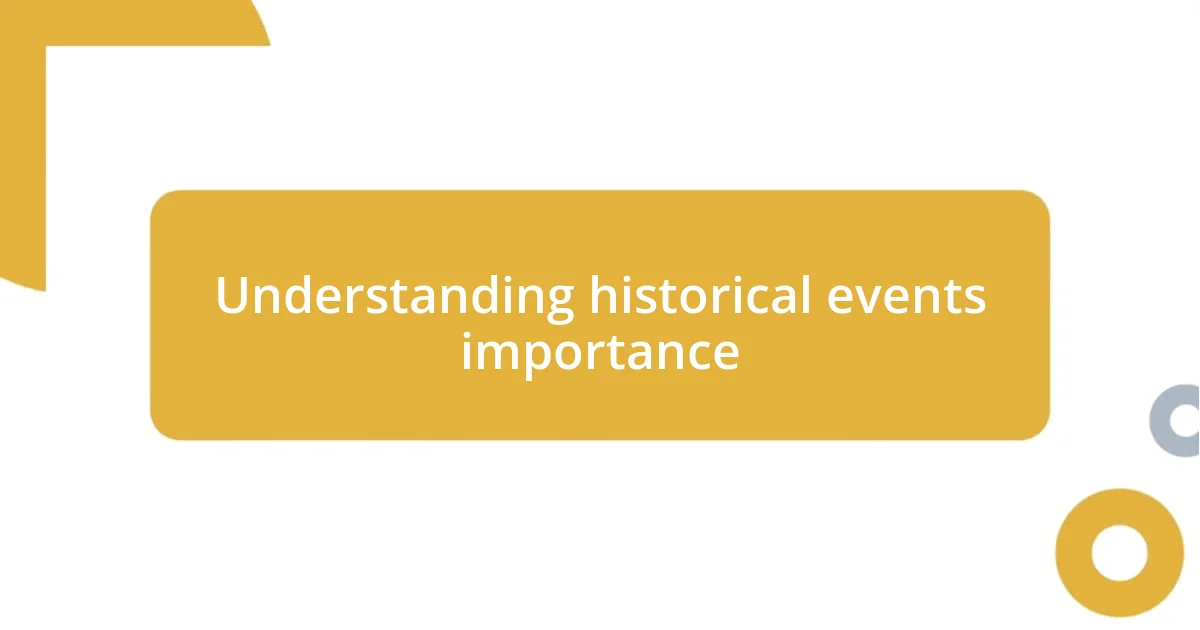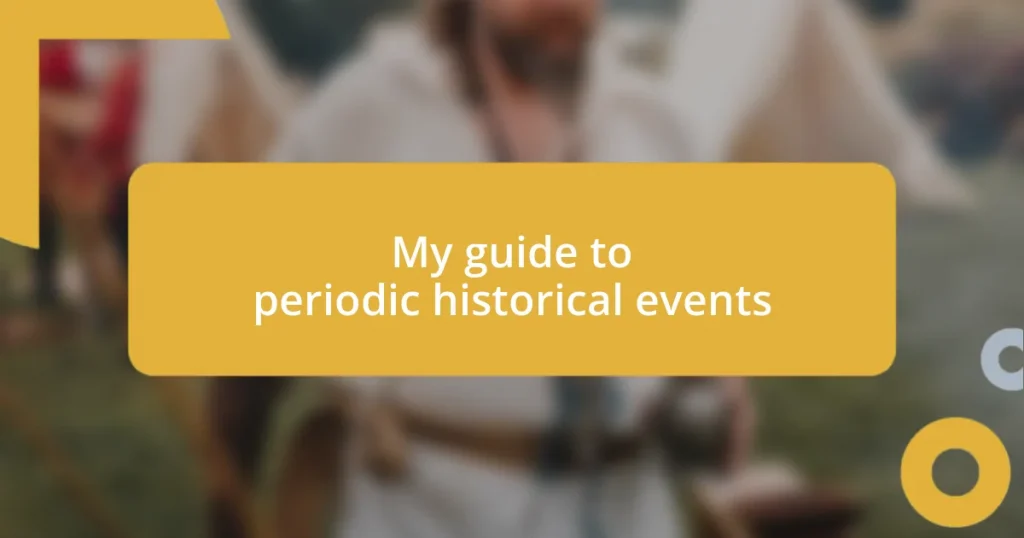Key takeaways:
- The Declaration of Independence in 1776 inspired global movements for freedom and equality.
- The landing on the Moon in 1969 showcased human achievement and the potential for innovation.
- The fall of apartheid in the early 1990s highlighted the struggle for justice and the importance of resilience in human rights progress.

Understanding historical events importance
Understanding the significance of historical events is crucial because they shape the fabric of our society. I remember when I first studied the Civil Rights Movement in school; it was eye-opening. I couldn’t help but wonder how the courage of activists influenced our current social dynamics. Isn’t it fascinating how past struggles pave the way for progress today?
Every historical event carries lessons that resonate through time. For instance, when learning about the fall of the Berlin Wall, I felt a mix of hope and sorrow. It struck me as a powerful reminder of resilience and the relentless pursuit of freedom. How can we not reflect on these stories and their impact on our values today?
Beyond just facts and dates, these events evoke emotions and prompt us to reflect on our shared humanity. I often think about the stories of ordinary people living through extraordinary times; they remind me of our capacity for change. Are we truly learning from the past, or are we at risk of repeating it? Engaging with history deeply invites us to explore these questions and find our place within this ongoing narrative.

Key periods in history
When considering key periods in history, I’m often struck by how they reflect humanity’s growth and resilience. For instance, the Renaissance, a flourishing of art and intellect, captivated my imagination when I first learned about it. I remember staring in awe at Leonardo da Vinci’s masterpieces, realizing how such creativity can inspire people centuries later. It underscores how transformative moments can ripple through time, igniting future generations.
- Ancient Civilizations: Engaged in agriculture, trade, and governance, laying foundations for modern society.
- The Middle Ages: Characterized by feudalism and the rise of monarchies, influencing social structures.
- The Renaissance: A rebirth of art and learning, transforming cultural landscapes.
- The Industrial Revolution: Revolutionized production and transformed economies, changing daily life.
- The 20th Century: Marked by significant events like both World Wars, shaping global politics and societies.
Reflecting on these periods, I find it enriching to think about how each one addresses unique challenges and achievements. For example, when I researched the Industrial Revolution, it made me appreciate the technological advancements we often take for granted, like the steam engine. Yet, it also prompted me to consider the societal effects, like worker rights and urbanization, which still resonate in our discussions today. Each key period invites us to analyze our present in light of historical narratives.

Major historical milestones
When I think about major historical milestones, I can’t help but reflect on the transformative events that have shaped our world. For instance, the signing of the Declaration of Independence in 1776 wasn’t just about breaking away from British rule. It created a ripple effect, inspiring countless movements for freedom and equality worldwide. I remember feeling a rush of inspiration upon discovering how its ideals still resonate today.
Another vivid milestone that comes to mind is the landing on the Moon in 1969. The moment Neil Armstrong stepped onto the lunar surface, I felt a rush of pride and wonder; it was the epitome of human achievement. Looking back at that event truly emphasizes how courage and ingenuity can propel us beyond what we once thought impossible. It’s intriguing how these milestones encourage us to dream bigger and think about our potential as a society.
A more recent milestone worth noting is the fall of apartheid in South Africa in the early 1990s. I have always admired Nelson Mandela’s resilience, and learning about his journey made me appreciate the struggle for justice deeply. This period marked a turning point not only for South Africa but for global human rights, reminding us that progress sometimes requires great sacrifices and unyielding hope.
| Milestone | Date |
|---|---|
| Declaration of Independence | 1776 |
| Moon Landing | 1969 |
| End of Apartheid | 1994 |

Influence of geography on history
Geography has always been a silent yet profound influence on historical events. For instance, I often think about how the Fertile Crescent in the Middle East became a cradle for early civilizations. With its rich soil and access to rivers, can you imagine how this abundance allowed societies to flourish? It’s like nature itself was providing the perfect conditions for progress.
In my own explorations of history, I’ve been fascinated by how mountains can both protect and isolate civilizations. For example, the Himalayas acted as a natural barrier for India, effectively shaping its culture and interactions with neighboring regions. It’s truly intriguing to consider how these geographic features not only define landscapes but also influence trade routes and social dynamics. How many stories could we uncover simply by studying a map?
Reflecting on maritime trade, I can’t help but marvel at how the Mediterranean Sea linked diverse cultures. While researching the ancient Phoenicians, I felt a sense of excitement when I learned about their seafaring prowess, allowing them to exchange goods and ideas across vast distances. Doesn’t it make you wonder how interconnected our world would be if we acknowledged geography’s crucial role in shaping human experiences? The ebb and flow of water truly crafted a world of exchange that resonates through history.

Cultural impacts of historical events
The cultural impacts of historical events are often deeply intertwined with societal evolution. I remember when I first learned about the Renaissance and how it sparked a rebirth of art, science, and literature after the Middle Ages. This era brought forth remarkable thinkers like Leonardo da Vinci and Michelangelo, whose work continues to inspire today. Isn’t it fascinating how a period of profound change can elevate creativity and set new standards for human expression?
Consider the Civil Rights Movement in the United States; it was not just about legal equality, but it significantly reshaped cultural narratives around race and justice. As I delved into the speeches of Martin Luther King Jr., I felt deeply moved by the way he articulated a vision of hope and unity, resonating across generations. The music, art, and literature that emerged during this time captured the emotions of struggle and triumph, influencing culture in ways that are still palpable today. How can we ignore the power of such profound movements in shaping our collective identity?
Another poignant example is the spread of Buddhism as it traveled from India to East Asia. When I first read about this cultural diffusion, I was struck by how philosophy and spirituality crossed borders and adapted to local customs. The art and architecture that developed, such as the serene temples and exquisite sculptures, reflect a profound cultural exchange that transcends time. Isn’t it incredible how belief systems can foster such creativity and connection across different societies?

Lessons learned from history
History is a treasure trove of lessons, often reminding us of our capacity for both growth and folly. I recall a discussion about World War I and how seemingly small decisions led to catastrophic consequences. This period taught me that our choices can send ripples across time—sometimes with unintended outcomes. Isn’t it humbling to realize how interconnected our actions truly are?
As I reflect on the fall of empires, particularly the Roman Empire, I find it striking how internal strife often delivered the final blow. The lessons of governance and the balance of power resonate today. I wonder, how many conflicts in our own times mirror those historical patterns? It makes me appreciate the need for effective leadership and unity in facing challenges.
In my life, I’ve often sought inspiration from the resilience displayed by societies recovering from crises, such as the aftermath of the Great Depression. The innovative spirit that emerged during that time resonates with me; it’s a powerful reminder that adversity can spark creativity and collaboration. Have you ever experienced a tough time that led to unforeseen opportunities? It’s a testament to how history teaches us that, even in our darkest hours, we have the capacity to rise and rebuild.

Applying history to modern life
The relevance of historical events in our daily lives often manifests in unexpected ways. For example, when I learned about the women’s suffrage movement, it deepened my appreciation for the rights I often take for granted. I remember feeling a wave of empowerment as I cast my vote for the first time, thinking about the courage of those women who fought tirelessly for that privilege. Can we fully grasp how their sacrifices paved the way for our current freedoms?
Everyday decisions in our workplaces or communities can reflect the patterns of history. As I’ve observed debates on social media regarding climate change, I can’t help but draw parallels to past environmental movements like the conservation efforts of the early 20th century. It’s fascinating to see how fresh perspectives from past activists continue to influence how we approach sustainability today. Are we truly learning from their experiences, or are we bound to repeat their struggles?
In my personal journey, I’ve found that understanding history can provide valuable insight into resilience. When reflecting on the rebuilding efforts after World War II, I’m often inspired by the sheer determination of people to create better futures out of chaos. In moments when I’m faced with challenges, remembering those historical triumphs fuels my belief that we can always reconstruct and innovate from setbacks. Isn’t it reassuring to think that history is not just a series of events, but a reservoir of experiences we can tap into for guidance?















